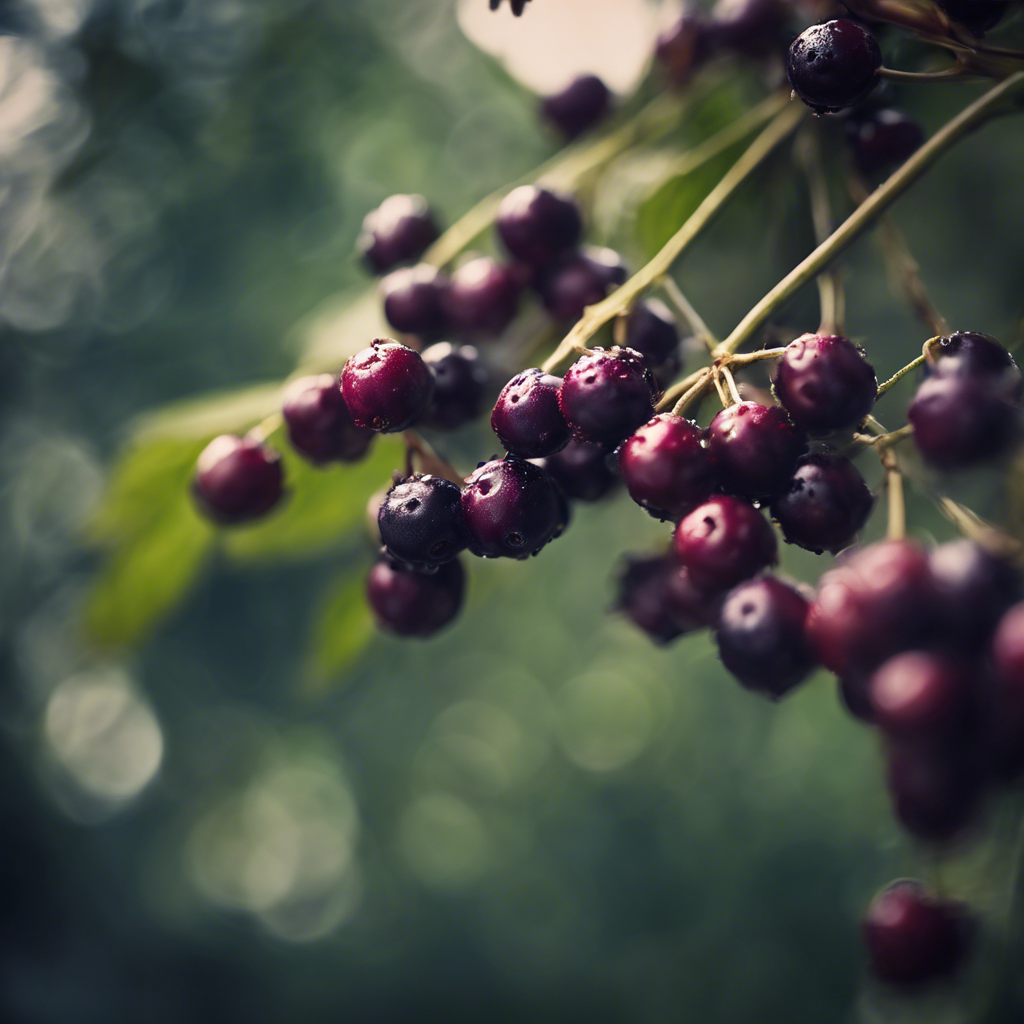Discover the benefits of elderberry fruit, including its health benefits, potential risks, and interesting facts. Learn about this powerful berry and debunk common myths associated with it.

Table of Contents
What is Elderberry?
Elderberry is a small, dark purple fruit that comes from the elder tree, scientifically known as Sambucus. Elder trees are typically found in Europe and North America. Elderberries grow in clusters and are often used in foods and beverages like jams, syrups, and teas due to their tangy and slightly sweet flavor.
Nutritional Profile:
Elderberries are known for their rich nutritional content, which includes a variety of vitamins, minerals, antioxidants, and dietary fiber. Here’s a breakdown of the nutritional content in elderberries per 100 grams:
| Nutrients | Value |
| Calories | 73 kcal |
| Carbohydrates | 18.4 grams |
| Sugars | 0 grams |
| Dietary Fiber | 7 grams |
| Protein | 0.7 grams |
| Fat | 0.5 grams |
| Saturated Fat | 0 grams |
| Monounsaturated Fat | 0.1 grams |
| Polyunsaturated Fat | 0.3 grams |
| Vitamins | Value |
| Vitamin C | 36 mg |
| Vitamin A | 30 IU |
| Vitamin B6 | 0.23 mg |
| Minerals | Value |
| Potassium | 280 mg |
| Calcium | 38 mg |
| Iron | 1.6 mg |
| Magnesium | 5 mg |
Health Benefits of elderberry:
Elderberry fruit is well-known for its impressive health benefits of elderberry fruit. Eating elderberries can support overall health in several ways, thanks to their rich nutrient profile and natural compounds.
- Boosts Immune System: Elderberries are packed with vitamin C and antioxidants, which help strengthen the immune system. This can make the body more resistant to common illnesses like colds and the flu. Elderberry supplements are often used during the cold and flu season to help shorten the duration of symptoms.
- Rich in Antioxidants: Elderberries contain high levels of antioxidants, particularly anthocyanins, which give the fruit its deep purple color. These antioxidants help protect the body’s cells from damage caused by free radicals, potentially reducing the risk of chronic diseases like heart disease and cancer.
- Supports Heart Health: Consuming elderberries may help support heart health. The fruit is known to help lower cholesterol levels and reduce inflammation, which are important for maintaining healthy blood vessels and reducing the risk of heart disease.
- Improves Skin Health: The vitamins and antioxidants in elderberries can also benefit the skin. Elderberry extracts are sometimes used in skincare products to help protect against environmental damage and keep the skin looking youthful and healthy.
- Aids in Digestive Health: Elderberries are a good source of dietary fiber, which is important for healthy digestion. Fiber helps regulate bowel movements and can prevent digestive issues like constipation.
While elderberries have many health benefits of elderberry fruit, it’s crucial to eat them cooked or processed. Raw elderberries can be toxic and cause nausea or other health problems. By enjoying elderberries in jams, syrups, or supplements, you can safely take advantage of their nutritional benefits.
Risks and Considerations:
While elderberry fruit offers several health benefits of elderberry fruit, there are some risks and considerations to keep in mind before consuming it. Understanding these can help ensure that you enjoy elderberries safely.
- Raw Elderberries Can Be Toxic: One of the most important things to know about elderberries is that they should never be eaten raw. Raw elderberries contain a substance called cyanogenic glycoside, which can release cyanide, a toxic compound, when consumed. Eating raw elderberries or parts of the elder tree, such as leaves, stems, or seeds, can cause nausea, vomiting, diarrhea, and even more severe symptoms in some cases.
- Proper Preparation is Key: To safely consume elderberries, they must be properly prepared by cooking or processing. Cooking elderberries destroys the toxic compounds, making them safe to eat. This is why elderberries are often found in cooked products like jams, syrups, and teas, where the harmful substances have been neutralized.
- Potential Allergic Reactions: Some people may be allergic to elderberries or develop sensitivity to them. Symptoms of an allergic reaction can include itching, rash, swelling, and difficulty breathing. If you have allergies to other berries or fruits, it’s wise to start with a small amount of elderberry to see how your body reacts.
- Interaction with Medications: Elderberry supplements and products might interact with certain medications, particularly those that affect the immune system or those used to treat autoimmune diseases. If you are taking any medication or have a health condition, it’s important to consult with a healthcare provider before adding elderberry to your diet.
- Not Recommended for Certain Groups: Pregnant or breastfeeding women, as well as young children, should avoid consuming elderberry products unless advised by a healthcare professional. The effects of elderberries on these groups have not been thoroughly studied, and it’s better to be cautious.
In summary, while elderberry fruit can be a healthy addition to your diet, it’s essential to consume it safely by cooking or processing it properly and being aware of any potential allergies or interactions with medications. Always consult with a healthcare professional if you have any concerns about adding elderberries to your diet.
Facts:
Elderberry fruit is fascinating and has been used for centuries for its health benefits of elderberry fruit and various applications. Here are some interesting facts about elderberry fruit:
- Small but Nutrient-Rich: Elderberries are small, dark purple berries that grow in clusters. Despite their size, they are packed with nutrients, including vitamins A and C, which are important for immune health, skin, and vision.
- Comes from the Elder Tree: The elderberry fruit comes from the elder tree, scientifically known as Sambucus. The most common variety is the European elder, or Sambucus nigra, which is often used in supplements and food products.
- Used in Traditional Medicine: Elderberries have a long history of use in traditional medicine. Ancient Egyptians used elderberries to improve their complexions and heal burns, while Native Americans used them to treat infections. Today, elderberries are still popular in natural remedies, especially for colds and flu.
- High in Antioxidants: Elderberries contain high levels of antioxidants, particularly anthocyanins, which give them their deep purple color. These antioxidants help protect the body’s cells from damage and are linked to many health benefits.
- Not Safe to Eat Raw: One crucial fact about elderberries is that they are not safe to eat raw. Raw elderberries, along with their leaves, stems, and seeds, contain toxic compounds that can cause nausea and other health issues. Cooking or processing elderberries removes these toxins, making them safe to consume.
- Versatile in the Kitchen: Elderberries are versatile and can be used in various recipes. They are commonly used to make jams, jellies, syrups, pies, and wines. Elderberry syrup is particularly popular as a natural remedy for colds and flu.
- Supports Wildlife: Not only humans can obtain benefits of elderberry fruit but also wildlife can. Birds and other animals eat the berries and help disperse the seeds, which supports the growth of new elderberry plants.
- Cultural Significance: In some cultures, elder trees and their berries have been considered sacred and are associated with folklore and mythology. For example, in European folklore, elder trees were believed to have protective properties and were planted near homes to ward off evil spirits.
These facts highlight the rich history and diverse uses, benefits of elderberry fruit, making it an interesting and beneficial fruit to learn about and enjoy.
Myths:
Elderberry fruit is well-known for its health benefits of elderberry fruit, but there are also many myths surrounding this small, dark purple berry. Understanding these myths can help you make informed decisions about including elderberries in your diet.
- Myth: Elderberries Are Safe to Eat Raw:
One common myth is that elderberries are safe to eat straight from the tree. However, this is not true. Raw elderberries contain toxic substances, such as cyanogenic glycosides, which can release cyanide when consumed. This can lead to nausea, vomiting, and other health issues. Elderberries should always be cooked or processed to remove these toxins before eating. - Myth: Elderberries Cure All Illnesses:
Some people believe that elderberries can cure a wide range of illnesses, from the common cold to more serious diseases. While elderberries have immune-boosting properties and can help reduce the severity of cold and flu symptoms, they are not a cure-all. Elderberries should be considered a supplement to a healthy lifestyle and not a replacement for medical treatments. - Myth: All Elderberries Are the Same:
Another myth is that all elderberries are the same and can be used interchangeably. In reality, there are different types of elderberries, such as the European elderberry (Sambucus nigra) and the American elderberry (Sambucus canadensis). While they share similar properties, there can be differences in their taste, nutrient content, and use in traditional remedies. It’s important to know which type you are using. - Myth: Elderberry Products Have No Side Effects:
Many believe that elderberry products have no side effects because they are natural. However, some people may experience mild side effects like digestive discomfort or allergic reactions. Additionally, elderberry supplements might interact with certain medications. It’s always a good idea to consult a healthcare professional before adding elderberry products to your routine, especially if you have existing health conditions or are taking medication. - Myth: Elderberry is a New Superfood Trend:
Some think elderberry is just another recent health trend. In truth, elderberries have been used for centuries in traditional medicine. Ancient cultures used elderberries for their supposed healing properties, and modern research is only beginning to explore and validate some of these traditional uses.
By debunking these myths, you can better understand the limitations and true benefits of elderberry fruit and how to safely incorporate it into your diet.
FAQ’s:
1) What is the elderberry used for?
Elderberry has been used in folk medicine to treat colds and flu. Elderberry is promoted as a dietary supplement for colds, flu, and other conditions. It has also been promoted for COVID-19 (the disease caused by the new coronavirus), but there is no good evidence to support its use.
2) What is the Indian name for elderberry?
In India, elderberry is not commonly found or widely recognized, so it does not have a specific traditional Indian name. However, the elderberry plant (Sambucus nigra) is sometimes referred to by its scientific name or simply called “elderberry” in English. In some regions, it might be loosely translated to “जंगली बेर” (Jangli Ber) in Hindi, which means “wild berry,” but this is not an exact or widely accepted name for elderberries in Indian languages.
3) Can I eat elderberries?
When uncooked, elderberries contain a toxic substance that can cause nausea, vomiting and diarrhea, so any preparation of elderberries you use should be cooked. Commercial preparations of elderberry such as syrups and lozenges don’t contain this substance and are generally recognized as safe for that reason.
